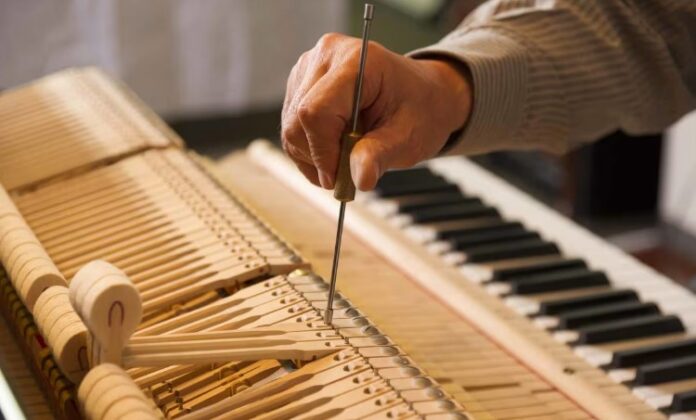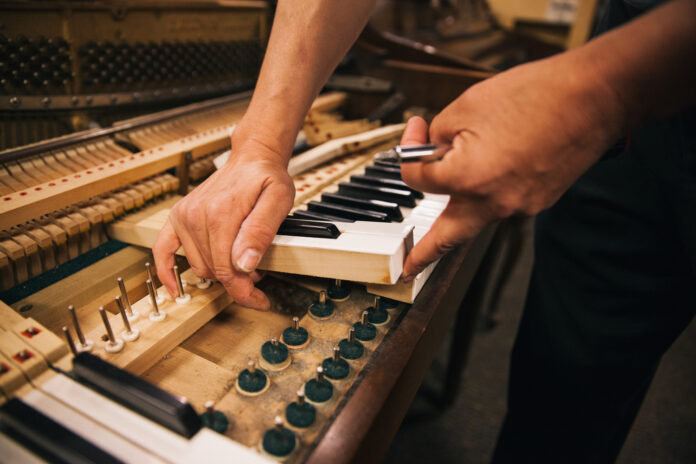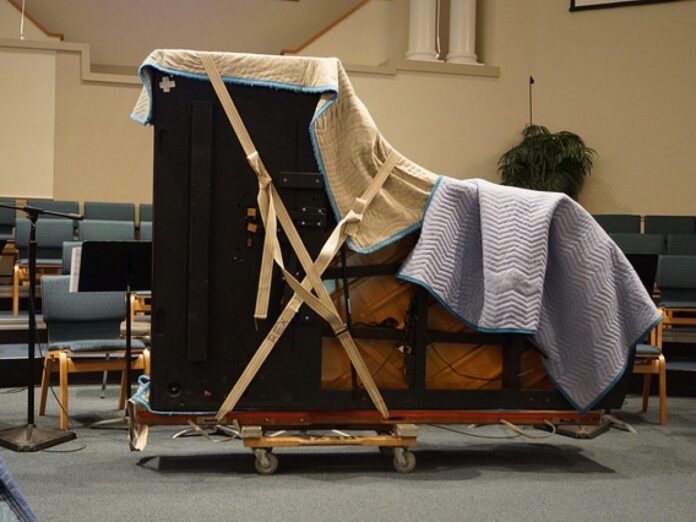Keeping your piano in top playing condition is important for any pianist. Regular maintenance and following tips from professional piano technicians can help your instrument sound its best for years to come. In this article, we’ll go over some of the key tasks you should perform yourself regularly, like tuning, cleaning, and humidity control. We’ll also cover when you need to call in a seasoned technician for repairs and how to find qualified specialists for the job. With the proper care and expertise, your piano can provide a lifetime of musical joy. Investing a little time and effort into proper piano maintenance pays off tremendously in preserving and maximizing this big investment.
Regular Maintenance

To maintain your piano on a regular basis, be sure to keep up with tuning, cleaning, and humidity control. Getting your piano tuned by a professional at least once per year will keep it at proper tension and pitch. In between tunings, you can clean your piano keys, pedals, and exterior with a soft cloth and piano polish to remove dirt and oils that can build up over time. Proper humidity between 40-50% will prevent cracking and warping of the soundboard and pins. Use a hygrometer monitor placed inside your piano to keep track of levels. In dry rooms or climates, use a humidifier to maintain piano humidity. Keeping your piano at the proper humidity will help it stay structurally intact and sound its best.
Minor Repairs

There are a few minor repairs you can do yourself between professional tunings. Tighten any loose tuning pins, screws, casters, or other parts that may have come loose over time. Sticking piano keys can be remedied with a few drops of piano key oil, working the key back and forth until it moves freely. Squeaky pedals are similarly remedied by oiling the axles, linkages, and pivot points of the pedal assembly. A sewing machine oil or powdered graphite works well for this. You can also tighten pedal screws if they’ve come loose. While these basic DIY repairs may seem daunting to a piano novice, they’re quite straightforward with a little guidance. Doing them yourself can save money compared to technician service calls for minor issues like these. Just take care not to over-tighten components or use too much oil.
When to Call a Technician
While minor repairs can be done yourself, you’ll need to call an experienced piano technician for major repairs or restoration work. Tasks like re-stringing, soundboard or pin block repairs, regulating, and voicing are best left to professionals. Older pianos in particular may need extensive restoration work. Technicians are also equipped to safely move a piano without causing internal or external damage. In addition to repair skills, professional technicians also have the proper equipment to safely move your heavy, delicate piano without causing internal strain or external damage if relocation is needed. Don’t take the risk of moving or improperly repairing an expensive, fragile instrument yourself. Leave major piano work to seasoned technicians with mastery of piano anatomy to get your instrument back to like-new functioning. So, just go to any music shop San Francisco to get a qualified consultation.
Choosing a Qualified Technician

When hiring someone to work on your piano, make sure they have proper credentials and training, such as through the Piano Technicians Guild. Read online reviews and ask for references to determine if they have satisfied customers. Establishing an ongoing relationship with one trusted technician who becomes intimately familiar with the unique quirks and needs of your individual instrument over years of service is ideal. This helps ensure your piano gets the highest quality care and retains its value. Don’t simply go with the cheapest option, or a non-credentialed friend or handyman claiming they can work on pianos without formal training. Entrusting your piano to a reputable professional with verified expertise is well worth the investment.
How to Safely Store Your Piano During Extended Periods of Non-Use

Pianos are often treasured family heirlooms, but there may come a time when they need to be stored temporarily, such as during a move or home renovation. Proper piano storage is crucial to ensure the instrument remains in good condition. When storing a piano, make sure it is kept in a climate-controlled environment to prevent extreme temperature and humidity fluctuations. This will help prevent damage to the wood, strings, and other components. Cover the piano with a specialized piano cover to protect it from dust and debris. Additionally, consider removing the piano’s legs or disassembling it to save space and reduce the risk of damage during storage. Finally, consult with a professional piano technician for guidance on preparing your piano for storage and ensuring it’s properly secured.
Maintaining Ideal Temperature and Humidity Levels for Your Piano’s Well-being

Maintaining the right climate conditions is essential for the health of your piano. Fluctuations in temperature and humidity can lead to tuning instability, cracked soundboards, and other issues. To create an ideal environment, invest in a high-quality digital hygrometer and thermometer to monitor conditions in the room where your piano resides. Aim for a consistent humidity level between 40-50% and a temperature range of 68-72 degrees Fahrenheit. If your location experiences extreme weather variations, consider using a climate control system, such as a piano-specific dehumidifier or humidifier. These devices can help maintain the optimal environment for your piano, ensuring it continues to produce beautiful, harmonious music for years to come.
With regular tuning, cleaning, and minor upkeep, your piano can stay in top form for many years. But don’t hesitate to call in a professional technician when major work is needed. Attempting extensive repairs without proper training and tools can potentially cause further damage and expense. Leave major jobs like replacing strings, refelting hammers, repairing the soundboard or pin block, regulating, and extensive refinishing work to seasoned professionals with mastery of your piano’s intricate workings. Following these piano maintenance tips from certified technicians will keep your precious instrument sounding its absolute best, retaining its value, and avoid the need for major restoration work as long as possible. With a balance of regular at-home upkeep and letting experts handle the big projects, your piano will be ready to make beautiful music for generations to come.









